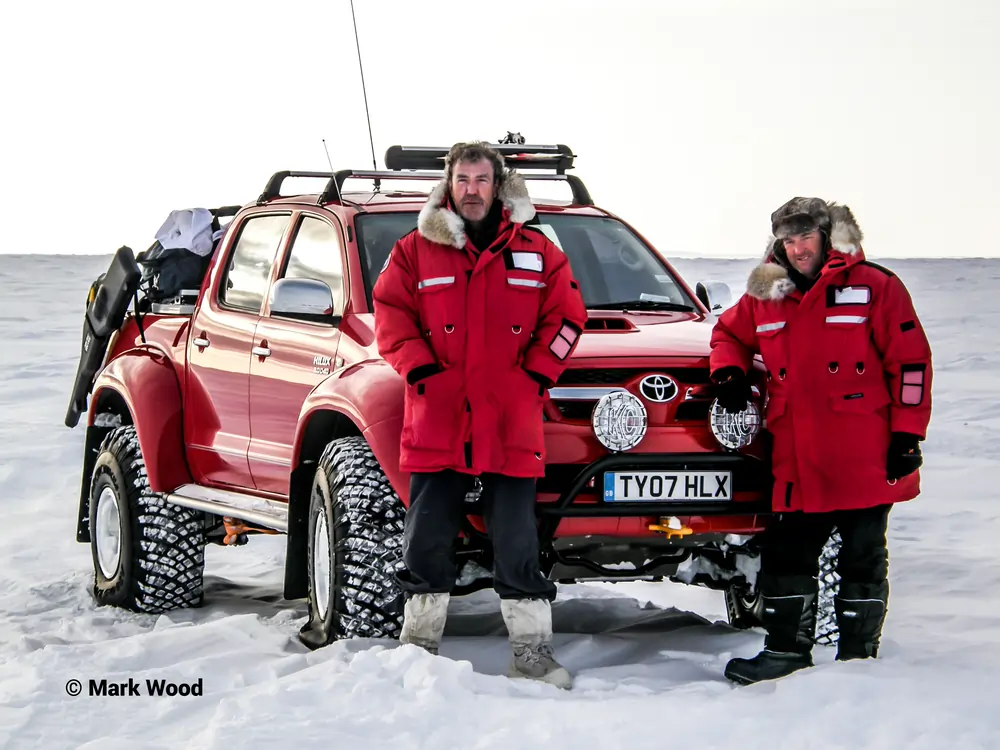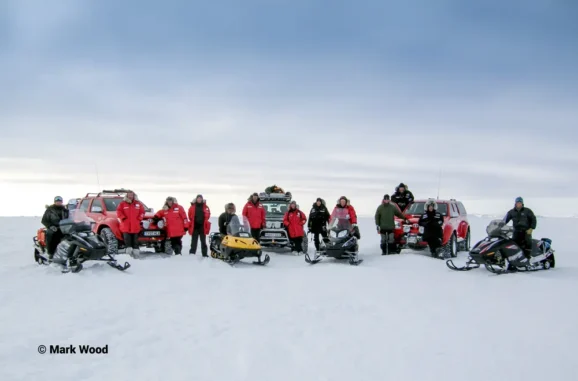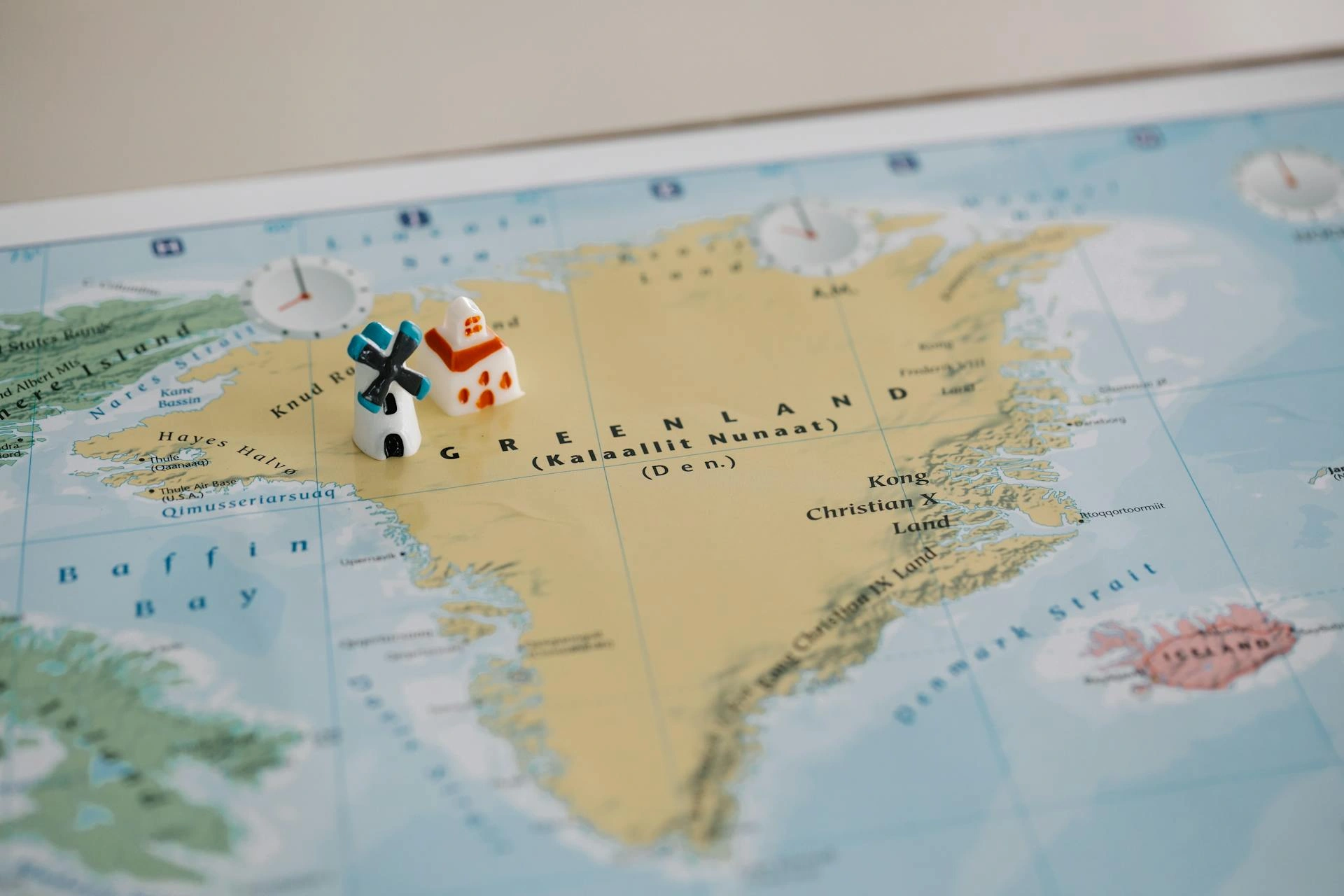No Snowflakes: Clarkson and May ‘True Polar Explorers’

Dr Linda Parker
- Published
- Home, Opinion & Analysis, Travel and Lifestyle

Like it or loathe it, Top Gear’s 2007 motorised assault on the North Pole marked a watershed moment in polar exploration, writes the renowned historian Dr Linda Parker
On 12th April this year, the cosmonauts Mikhail Kornienko, Alexander Lynnik, and Denis Efremov leapt out of an Ilyushin Il-76 aircraft 10,000m above the icy wastes of the North Pole. The stratospheric air at the Pole is too thin to support a parachute, so the trio had to freefall for a full two minutes – in temperatures of minus 70 degrees Celsius – before their canopies could open. When they landed, safely, at the Barneo Polar base, a temporary inhabited camp near the North Pole, the men had made history after completing the world’s first stratospheric jump over one of the Polar regions.
I have already heard it said that the record those cosmonauts set is less impressive than the feats accomplished in the so-called ‘glory days’ of Polar exploration. How can parachuting to the North Pole – a ‘stunt’, at best, surely – be compared to the gruelling, bona fide expeditions of yesteryear?
It is tempting to look back at polar exploration with rose-tinted, romanticised spectacles. But the truth is that every single adventurer who has set foot at or flown over either Pole relied on and employed the latest technology and innovations to aid their objective. This dates back to the beginning of the 20th-Century, the ‘heroic age’ of polar exploration, when the likes of Captain Robert Scott, Ernest Shackleton, John Franklin, Robert Peary, Frederick Cook, and Roald Amundsen were each competing for fame and glory at the top and bottom of the planet. Those men did not have the relative luxury of GPS and modern equipment and clothing, but nor did that mean they set off without at least some of the best kit available at that time. Early expeditions were a source of fiercely-competition national pride and had substantial – and in some cases, almost limitless – financial backing. Anything that may have helped would have been acquired.
I’m frequently asked whether Captain Scott et al would have accepted navigational aids and motorised vehicles like those we use today had they been on offer. The answer, of course, is a resounding ‘yes’. Why would they not? Those early explorers, much like today, were media giants with publishing deals, paid speaking gigs, and back-to-back public appearances. Success meant everything.
This is all not to say that all polar feats are equal in terms of physicality. The British explorers Ranulph Fiennes and Mike Stroud, for instance, were the first people to cross Antarctica entirely on foot and unsupported. By any objective measure, this was a more arduous challenge than parachuting to the North Pole, regardless of the frostbite and obvious dangers those cosmonauts faced that day, and a substantially easier undertaking than driving to it a la Jeremy Clarkson.

For anyone who missed it, Clarkson and Top Gear co-presenter James May team travelled in a modified Toyota Hilux, complete with folding toilet seat and cocktails, to the magnetic North Pole in 2007. Their goal was to prove that cars could make polar exploration quicker and more luxurious than traditional means of travel like dog sled.
Events were dramatized and the team were reportedly some way off the true magnetic North Pole when they arrived. But prove a point, they did. Like it or loathe it, the Top Gear expedition was a watershed moment in the development of Polar research and exploration. Light-hearted and comedic as it was, Clarkson and May’s attempt was in many ways in the same tradition of the early pioneers. Yes, they had support vehicles and camera crews in tow, and yes, they no doubt had some of the best technological innovations available to them. But was Clarkson’s mindset really so different to that of the early 20th-Century explorers? Their journeys, financial backers, and equipment were different, certainly, and the risk of physical injury and death substantially smaller, but their ‘derring do’ attitude – one shared by the Russian cosmonauts, no doubt – is common to all who have set foot in a polar region. In the annals of history, true explorers push the boundaries of what is possible, and Clarkson, May, and Kornienko et al did just that. It pains me to say it, but in the long annals of history, the Top Gear presenters will go down as true explorers and pioneers.
I for one hope a Toyota Hilux, or anything like it, never gets near the Pole again. But as technology continues to advance at breakneck speeds, the chances are slim. A new era of polar exploration has arrived – and I’m secretly quite excited by it.

Dr. Linda Parker is widely considered to be one of Britain’s leading polar and military historians. She is the author of six acclaimed books, an in-demand public speaker, the co-founder of the British Modern Military History Society, and the editor of Front Line Naval Chaplains’ magazine, Pennant, which examines naval chaplaincy’s historical and contemporary role.
Images © Mark Wood
RECENT ARTICLES
-
 Why Europe’s finance apps must start borrowing from each other’s playbooks
Why Europe’s finance apps must start borrowing from each other’s playbooks -
 Why universities must set clear rules for AI use before trust in academia erodes
Why universities must set clear rules for AI use before trust in academia erodes -
 The lucky leader: six lessons on why fortune favours some and fails others
The lucky leader: six lessons on why fortune favours some and fails others -
 Reckon AI has cracked thinking? Think again
Reckon AI has cracked thinking? Think again -
 The new 10 year National Cancer Plan: fewer measures, more heart?
The new 10 year National Cancer Plan: fewer measures, more heart? -
 The Reese Witherspoon effect: how celebrity book clubs are rewriting the rules of publishing
The Reese Witherspoon effect: how celebrity book clubs are rewriting the rules of publishing -
 The legality of tax planning in an age of moral outrage
The legality of tax planning in an age of moral outrage -
 The limits of good intentions in public policy
The limits of good intentions in public policy -
 Are favouritism and fear holding back Germany’s rearmament?
Are favouritism and fear holding back Germany’s rearmament? -
 What bestseller lists really tell us — and why they shouldn’t be the only measure of a book’s worth
What bestseller lists really tell us — and why they shouldn’t be the only measure of a book’s worth -
 Why mere survival is no longer enough for children with brain tumours
Why mere survival is no longer enough for children with brain tumours -
 What Germany’s Energiewende teaches Europe about power, risk and reality
What Germany’s Energiewende teaches Europe about power, risk and reality -
 What the Monroe Doctrine actually said — and why Trump is invoking it now
What the Monroe Doctrine actually said — and why Trump is invoking it now -
 Love with responsibility: rethinking supply chains this Valentine’s Day
Love with responsibility: rethinking supply chains this Valentine’s Day -
 Why the India–EU trade deal matters far beyond diplomacy
Why the India–EU trade deal matters far beyond diplomacy -
 Why the countryside is far safer than we think - and why apex predators belong in it
Why the countryside is far safer than we think - and why apex predators belong in it -
 What if he falls?
What if he falls? -
 Trump reminds Davos that talk still runs the world
Trump reminds Davos that talk still runs the world -
 Will Trump’s Davos speech still destroy NATO?
Will Trump’s Davos speech still destroy NATO? -
 Philosophers cautioned against formalising human intuition. AI is trying to do exactly that
Philosophers cautioned against formalising human intuition. AI is trying to do exactly that -
 Life’s lottery and the economics of poverty
Life’s lottery and the economics of poverty -
 On a wing and a prayer: the reality of medical repatriation
On a wing and a prayer: the reality of medical repatriation -
 Ai&E: the chatbot ‘GP’ has arrived — and it operates outside the law
Ai&E: the chatbot ‘GP’ has arrived — and it operates outside the law -
 Keir Starmer, Wes Streeting and the Government’s silence: disabled people are still waiting
Keir Starmer, Wes Streeting and the Government’s silence: disabled people are still waiting -
 The fight for Greenland begins…again
The fight for Greenland begins…again


























